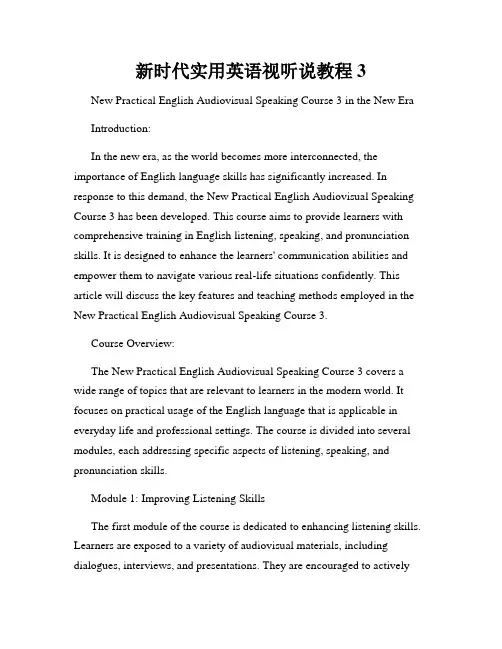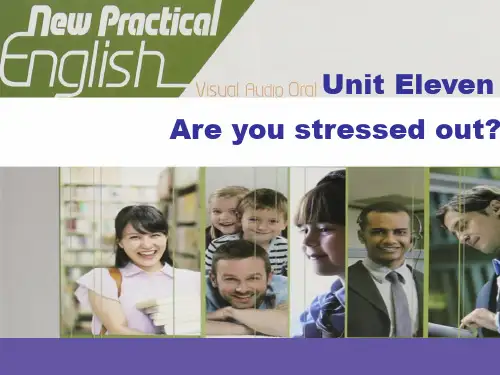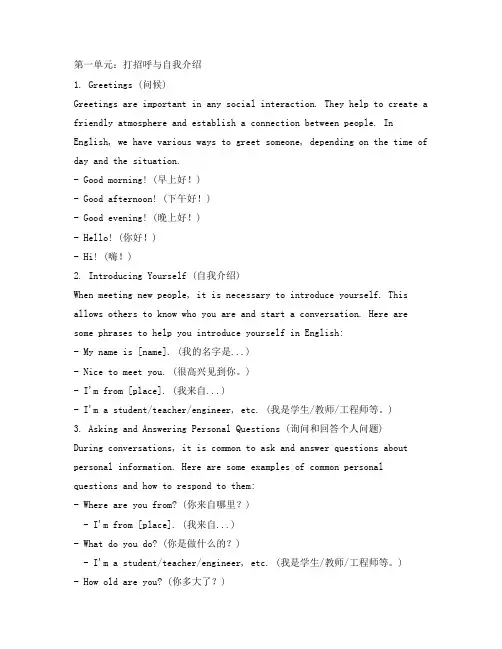编实用英语视听说
- 格式:ppt
- 大小:814.50 KB
- 文档页数:26




新时代实用英语视听说教程3New Practical English Audiovisual Speaking Course 3 in the New EraIntroduction:In the new era, as the world becomes more interconnected, the importance of English language skills has significantly increased. In response to this demand, the New Practical English Audiovisual Speaking Course 3 has been developed. This course aims to provide learners with comprehensive training in English listening, speaking, and pronunciation skills. It is designed to enhance the learners' communication abilities and empower them to navigate various real-life situations confidently. This article will discuss the key features and teaching methods employed in the New Practical English Audiovisual Speaking Course 3.Course Overview:The New Practical English Audiovisual Speaking Course 3 covers a wide range of topics that are relevant to learners in the modern world. It focuses on practical usage of the English language that is applicable in everyday life and professional settings. The course is divided into several modules, each addressing specific aspects of listening, speaking, and pronunciation skills.Module 1: Improving Listening SkillsThe first module of the course is dedicated to enhancing listening skills. Learners are exposed to a variety of audiovisual materials, including dialogues, interviews, and presentations. They are encouraged to activelylisten and comprehend the content while paying attention to pronunciation, intonation, and vocabulary usage. Through extensive practice, learners develop their ability to understand authentic English conversations and extract essential information accurately.Module 2: Developing Speaking SkillsThe second module focuses on developing speaking skills. Learners engage in interactive activities, such as role-plays, discussions, and presentations, to enhance their fluency and accuracy in spoken English. Emphasis is placed on developing clear articulation, appropriate use of expressions, and effective communication strategies. Through constant practice and feedback from instructors, learners gain confidence in expressing themselves in various situations, both formal and informal.Module 3: Mastering PronunciationThe third module is designed specifically to help learners master English pronunciation. Through the use of audiovisual materials and pronunciation exercises, learners are exposed to different phonetic sounds and patterns. They learn to differentiate between similar sounds, stress syllables correctly, and improve overall pronunciation clarity. Pronunciation drills and individual feedback enable learners to overcome specific challenges and develop a near-native accent.Teaching Methodology:The teaching methodology employed in the New Practical English Audiovisual Speaking Course 3 is learner-centered and communicative. It emphasizes active participation, interaction, and practical application oflanguage skills. The course incorporates a variety of teaching strategies, such as group discussions, pair work, and multimedia presentations, to engage learners and facilitate their language acquisition.Instructors, who are highly qualified and experienced in teaching English as a second language, create a supportive and inclusive learning environment. They provide personalized guidance and constructive feedback to help learners improve their skills effectively. Additionally, technology is integrated into the course, enabling learners to access online resources, practice listening exercises, and receive instant feedback on their pronunciation.Conclusion:The New Practical English Audiovisual Speaking Course 3 is a comprehensive and effective program for learners seeking to enhance their English language skills. Through its modules on improving listening skills, developing speaking skills, and mastering pronunciation, learners are equipped with the necessary tools to communicate confidently in various real-life contexts. The learner-centered approach, coupled with the expertise of instructors and incorporation of technology, ensures that learners not only acquire language skills but also develop a deep understanding of the English language. With the New Practical English Audiovisual Speaking Course 3, learners can embark on a successful journey towards becoming proficient English speakers in the new era.。



新编实用英语视听说第四版答案1、Mary _______ a small gift yesterday, but she didn’t _______ it. [单选题] *A. accepted; receiveB. received; accept(正确答案)C. receives; acceptedD. accepts; received2、My father?is _______ flowers. [单选题] *A. busy watering(正确答案)B. busy waterC. busy with wateringD. busy with water3、He _______ walks to school, because he lives near school. [单选题] *A. sometimes(正确答案)B. neverC. doesn’tD. don’t4、The storybook is very ______. I’m very ______ in reading it. ()[单选题] *A. interesting; interested(正确答案)B. interested; interestingC. interested; interestedD. interesting; interesting5、74.No person ()carry a mobile phone into the examination room during the national college Entrance Examinations.[单选题] *A.shall(正确答案)B.mustC.canD.need6、—It’s too noisy outside. I can’t fall asleep.—I can’t, either. We have to ______ new ways to solve the problem.()[单选题] *A. come up with(正确答案)B. get on withC. make up withD. catch up with7、I saw the boy _______?the classroom. [单选题] *A. enter intoB. enter(正确答案)C. to enter intoD. to enter8、I’d like to know the _______ of the club. [单选题] *A. schedule(正确答案)B. schoolC. menuD. subject9、Mum is ill. I have to _______ her at home. [单选题] *A. look after(正确答案)B. look forC. look outD. look forward to10、53.On your way home, you can buy some fruit, meat, vegetables and ________. [单选题] * A.something else(正确答案)B.else somethingC.everything elseD.else everything11、Before leaving the village, he visited the old house _____ he spent his childhood. [单选题] *A in which(正确答案)B. whichC. to whichD at which12、1.I saw ________ action film with my friend yesterday, and ________ film was amazing. [单选题] *A.a...aB.a...theC.an...the(正确答案)D.an...a13、44.—Hi, Lucy. You ________ very beautiful in the new dress today.—Thank you very much. [单选题] *A.look(正确答案)B.watchC.look atD.see14、( )Keep quiet, please. It’s ________ noisy here. [单选题] *A. many tooB. too manyC. too muchD. much too(正确答案)15、Alice is a ______ girl. She always smiles and says hello to others.()[单选题] *A. shyB. strictC. healthyD. friendly(正确答案)16、He always ______ the teacher carefully in class. [单选题] *A. listensB. listens to(正确答案)C. hearsD. hears of17、You have failed two tests. You’d better start working harder, ____ you won’t pass the course. [单选题] *A. andB. soC. butD. or(正确答案)18、--Do you have a _______?--Yes, I _______ at a clothes store. [单选题] *A. work; workB. work; jobC. job; jobD. job; work(正确答案)19、Allen is looking forward to _______ his American partner at the trade fair. [单选题] *A. meetB. meeting(正确答案)C. be meetingD. having meeting20、There are about eight ______ students in my school.()[单选题] *A. hundred(正确答案)B. hundredsC. hundred ofD. hundreds of21、I am worried about my brother. I am not sure _____ he has arrived at the school or not. [单选题] *A. whether(正确答案)B. whatC. whenD. how22、Your homework must_______ tomorrow. [单选题] *A. hand inB. is handed inC. hands inD. be handed in(正确答案)23、It’s raining heavily outside. Don’t leave _______ it stops. [单选题] *A. whileB. sinceC. until(正确答案)D. when24、The yellow bag _______ me. [单选题] *A. belong toB. belongs to(正确答案)C. belongD. belongs25、41.—________ do you take?—Small, please. [单选题] *A.What size(正确答案)B.What colourC.How manyD.How much26、Boys and girls, _______ up your hands if you want to take part in the summer camp(夏令营).[单选题] *A. puttingB. to putC. put(正确答案)D. puts27、—Would you like some milk?—Yes, just _____, please. [单选题] *A. a little(正确答案)B. littleC. a fewD. few28、John Smith is _______ of the three young men. [单选题] *A. strongB. strongerC. the strongerD. the strongest(正确答案)29、He used to get up at six in the morning,()? [单选题] *A. used heB. did heC. didnt he (正确答案)D. should he30、What about _______ there by bike? [单选题] *A. goesB. wentC. goD. going(正确答案)。


第一单元:打招呼与自我介绍1. Greetings (问候)Greetings are important in any social interaction. They help to create a friendly atmosphere and establish a connection between people. In English, we have various ways to greet someone, depending on the time of day and the situation.- Good morning! (早上好!)- Good afternoon! (下午好!)- Good evening! (晚上好!)- Hello! (你好!)- Hi! (嗨!)2. Introducing Yourself (自我介绍)When meeting new people, it is necessary to introduce yourself. This allows others to know who you are and start a conversation. Here are some phrases to help you introduce yourself in English:- My name is [name]. (我的名字是...)- Nice to meet you. (很高兴见到你。
)- I'm from [place]. (我来自...)- I'm a student/teacher/engineer, etc. (我是学生/教师/工程师等。
)3. Asking and Answering Personal Questions (询问和回答个人问题)During conversations, it is common to ask and answer questions about personal information. Here are some examples of common personal questions and how to respond to them:- Where are you from? (你来自哪里?)- I'm from [place]. (我来自...)- What do you do? (你是做什么的?)- I'm a student/teacher/engineer, etc. (我是学生/教师/工程师等。


实用英语视听说教程(第2册第2版)介绍实用英语视听说教程(第2册第2版)是一套为学习者提供视听说训练的教材。
本教材以提高学习者的英语口语和听力技能为目标,通过丰富的视听材料,帮助学习者更好地理解和运用英语。
本文档将对教程的主要内容和特点进行介绍。
内容实用英语视听说教程(第2册第2版)包括以下主要内容:1.单元综述:每个单元以一个主题为线索,通过介绍主题相关的话题和场景,激发学习者的兴趣,并为后续的视听材料做铺垫。
2.视听材料:每个单元包含多个视听材料,如录音对话、短片、新闻报道等。
这些材料涵盖日常生活、学习、工作、旅行等各个方面,真实反映英语作为国际交流工具的应用场景。
3.学习目标:每个单元都设定了明确的学习目标,帮助学习者了解自己需要达到的语言能力水平。
4.听力练习:教材提供了丰富多样的听力练习,包括听力理解、听力填空、听力选择等,帮助学习者提高听力技能。
5.口语练习:通过一系列口语练习,学习者可以运用所学的语言知识进行口语表达,并提高口语流利度和准确性。
6.语音训练:教材也包括语音训练内容,帮助学习者正确发音,并纠正常见的语音错误。
7.课文朗读:每个单元都有精选的课文,学习者可以朗读课文,提升语音语调和语感。
8.扩展活动:教材提供了一些扩展活动,帮助学习者加深对所学内容的理解和运用。
特点实用英语视听说教程(第2册第2版)具有以下特点:1.真实性:教材使用了大量真实的视听材料,反映现实生活中的英语应用场景,帮助学习者更好地适应实际交流环境。
2.多样性:教材提供了多样化的视听材料,包括对话、短片、新闻报道等,涵盖了各个方面的话题和内容,满足不同学习者的兴趣和需求。
3.可操作性:教材设计了丰富的练习和活动,帮助学习者将所学知识运用到实际情境中,提高实际应用能力。
4.系统性:教材按照一定的学习路径和顺序进行编排,有利于学习者的逐步学习和积累。
5.提高听力口语技能:教材注重培养学习者的听力和口语技能,帮助他们更好地理解和表达英语,增强语言交流的自信心。
新编实用英语视听说基础教程第四版答案61、The car _______ after forty minutes driving, so he didn’t have the interview on time. [单选题] *A. broke down(正确答案)B. broke inC. broke outD. broke up2、41.—________ do you take?—Small, please. [单选题] *A.What size(正确答案)B.What colourC.How manyD.How much3、Modern plastics can()very high and very low temperatures. [单选题] *A. stand(正确答案)B. sustainC. carryD. support4、I don’t know how to improve my English. Can I ask you for some _______? [单选题] *A. answersB. advice(正确答案)C. questionsD. words5、一Mary wants to invite you to see the movie today. 一I would rather she(B)me tomorrow. [单选题] *A.tellsB. told (正确答案)C. would tellD. had told6、With all the work on hand, he _____ to the cinema last night. [单选题] *A.should goB.must have goneC.might goD..shouldn’t have gone(正确答案)7、Nearly two thousand years have passed _____ the Chinese first invented the compass. [单选题] *A. whenB. beforeC. since(正确答案)D. after8、If you don’t feel well, you’d better ask a ______ for help. [单选题] *A. policemanB. driverC. pilotD. doctor(正确答案)9、It’s raining heavily outside. Don’t leave _______ it stops. [单选题] *A. whileB. sinceC. until(正确答案)D. when10、I gave John a present but he gave me nothing_____. [单选题] *A.in advanceB.in vainC.in return(正确答案)D.in turn11、--Is that the correct spelling?--I don’t know. You can _______ in a dictionary [单选题] *A. look up itB. look it forC. look it up(正确答案)D. look for it12、93.Welcome ________ our school! [单选题] *A.to(正确答案)B.inC.atD./13、I was astonished when I heard that Louise was getting married. [单选题] *A. 惊讶(正确答案)B. 气愤C. 高兴D. 想念14、The manager gave one of the salesgirls an accusing look for her()attitude towards customers. [单选题] *A. impartialB. mildC. hostile(正确答案)D. opposing15、In fact, Beethoven did something brave than dying. [单选题] *A. 勇敢(正确答案)B. 冒险C. 可怕D. 奇妙16、______ visitors came to take photos of Hongyandong during the holiday. [单选题] *A. ThousandB. Thousand ofC. ThousandsD. Thousands of(正确答案)17、It’s windy outside. _______ your jacket, Bob. [单选题] *B. Put on(正确答案)C. Take offD. Wear18、The children were all looking forward to giving the old people a happy day. [单选题]*A. 寻找B. 期盼(正确答案)C. 看望D. 继续19、This kind of banana tastes very _______. [单选题] *A. nice(正确答案)B. wellC. nicelyD. better20、—Where did you get the book?—From my friend. I ______ it three days ago. ()[单选题] *A. lentB. borrowed(正确答案)D. returned21、The language school started a new()to help young learners with reading and writing. [单选题] *A. course(正确答案)B. designC. eventD. progress22、( ) --------Please take my seat here.-------- __________________________. [单选题]*A. That is nice of you(正确答案)B. I think it is my seatC. No, you sit hereD. I don’t think it’s a good seat.23、The sun disappeared behind the clouds. [单选题] *A. 出现B. 悬挂C. 盛开D. 消失(正确答案)24、65.There is a big sale on in the shop! Every-thing is ________ price. [单选题] * A.bigB.fullC.zeroD.half(正确答案)25、—Are these your sheep? [单选题] *A)on grass at the foot of the hill.(正确答案)B. feedC.is fedD. is feeding26、My father?is _______ flowers. [单选题] *A. busy watering(正确答案)B. busy waterC. busy with wateringD. busy with water27、____ is standing at the corner of the street. [单选题] *A. A policeB. The policeC. PoliceD. A policeman(正确答案)28、John is fond of playing _____ basketball and Jack is keen on playing _____ piano. [单选题] *A./…the(正确答案)B.the…/C./…/D.the…the29、It was()of you to get up early to catch the first bus so that you could avoid the traffic jam. [单选题] *A. senselessB. sensible(正确答案)C. sentimentalD. sensitive30、30.It is known that ipad is _________ for the old to use. [单选题] *A.enough easyB.easy enough (正确答案)C.enough easily D.easily enough。
新编实用英语视听说高级教程episode4答案1、Many people prefer the bowls made of steel to the _____ made of plastic. [单选题] *A. itB. ones(正确答案)C. oneD. them2、The little boy saved his money ______ he could buy his mother a gift on Mother’s Day.()[单选题] *A. butB. such thatC. in order toD. so that(正确答案)3、9.There will be a lot of activities at English Festival nest month. Which one would you like to ________? [单选题] *A.take part in (正确答案)B.joinC.attendD.go4、_______ travelers come to visit our city every year. [单选题] *A. Hundred ofB. Hundreds of(正确答案)C. Five HundredsD. Five hundred?of5、I’m sorry there are ______ apples in the fridge. You must go and buy some right now.()[单选题] *A. a littleB. littleC. a fewD. few(正确答案)6、—Who came to your office today, Ms. Brown?—Sally came in. She hurt ______ in P. E. class. ()[单选题] *A. sheB. herC. hersD. herself(正确答案)7、Modern plastics can()very high and very low temperatures. [单选题] *A. stand(正确答案)B. sustainC. carryD. support8、Don’t forget _______ those books when you are free. [单选题] *A. to read(正确答案)B. readingC. readD. to reading9、I usually do some ____ on Sundays. [单选题] *A. cleaningsB. cleaning(正确答案)C. cleansD. clean10、For more information, please _______ us as soon as possible. [单选题] *A. confidentB. confidenceC. contact(正确答案)D. concert11、—Can you play the violin at the art festival?—No, I ______. But I am good at playing the drums.()[单选题] *A. canB. can’t(正确答案)C. doD. don’t12、Guilin is _______ its beautiful scenery. [单选题] *A. famous for(正确答案)B. interested inC. fond ofD. careful with13、( )He killed the enemy guard and made away _________the villagers. [单选题] *A. with the helpB. with helpC. with help ofD. with the help of(正确答案)14、Mary _______ Math. [单选题] *A. is good at(正确答案)B. do well inC. is good forD. is good with15、The Spring Festival is on the way.Many shops have _______ huge posters with the word sales. [单选题] *A. put up(正确答案)B. put onC. put outD. put off16、37.—What will you be ___________?—I'm not sure. Maybe I'll be a doctor like my father. [单选题] *A.right nowB.in the future(正确答案)C.at onceD.at the moment17、____ is standing at the corner of the street. [单选题] *A. A policeB. The policeC. PoliceD. A policeman(正确答案)18、Now people can _______ with their friends far away by e-mail, cellphone or letter. [单选题] *A. keep onB. keep in touch(正确答案)C. keep upD. keep off19、When Max rushed to the classroom, his classmates _____ exercises attentively. [单选题] *A. didB. have doneC. were doing(正确答案)D. do20、14.Builders have pulled down many old houses, and they will build a lot of new ________. [单选题] *A.ones (正确答案)B.oneC.the onesD.the one21、29.______ my free time, I like listening to music. [单选题] *A.AtB.OnC.In(正确答案)D.About22、Many children have to _______ their parents. [单选题] *A. divide intoB. put onC. depend on(正确答案)D. take on23、—It’s too noisy outside. I can’t fall asleep.—I can’t, either. We have to ______ new ways to solve the problem.()[单选题] *A. come up with(正确答案)B. get on withC. make up withD. catch up with24、79.On a ________ day you can see the city from here. [单选题] *A.warmB.busyC.shortD.clear(正确答案)25、I should like to rent a house which is modern, comfortable and _____, in a quiet neighborhood. [单选题] *A.in allB. after allC. above all(正确答案)D. over all26、--Do you know _______ girl with long curly hair?--Yes. She is Mary. She plays _______ piano very well. [单选题] *A. a; /B. the; /C. the; the(正确答案)D. a; the27、Online shopping _______ very popular now. [单选题] *A. is(正确答案)B. areC. wasD. were28、_______ a busy afternoon! [单选题] *A. HowB. What(正确答案)C. WhichD. Wish29、_______, Mr. Smith. [单选题] *A. Here your tea isB. Here is your tea(正确答案)C. Here your tea areD. Here are your tea30、I think you should buy this novel. It is really worth _____. [单选题] *A. reading(正确答案)B. being readC. readD. to read。
21世纪实用英语视听说教程4答案Unit 1: Personal InformationPart A1.What is Lisa’s nationality?–Lisa is Australian.2.Where is her hometown?–Her hometown is Perth.3.Does she have any brothers or sisters?–Yes, she has one brother and two sisters.4.What does Lisa’s brother do?–Lisa’s brother is a dentist.5.What are Lisa’s sisters’ names?–Her sisters’ names are Emma and Kate. Part B1.What does John do in his free time?–In his free time, John likes to play basketball and go swimming.2.What is John’s favorite hobby?–John’s favorite hobby is painting.3.Who is John’s favorite painter?–John’s favorite painter is Vincent van Gogh.4.How often does John go to art exhibitions?–John goes to art exhibitions once or twice a month.5.Where does John plan to go next Saturday?–John plans to go to the local art museum next Saturday.Unit 2: Daily RoutinePart A1.What time does Mary usually wake up in the morning?–Mary usually wakes up at 7 o’clock in the morning.2.Does she have breakfast at home or outside?–She has breakfast at home.3.Where does Mary work?–Mary works at a marketing company.4.What time does she usually finish work?–She usually finishes work at 6 o’clock in the evening.5.What does Mary usually do in the evening?–In the evening, Mary usually goes to the gym or meets friends for dinner.Part B1.What time does David usually go to bed?–David usually goes to bed at 11 o’clock at night.2.Does he watch TV before going to bed?–No, he doesn’t watch TV before going to bed.3.What does David do in the morning?–In the morning, David goes for a run or does yoga.4.Does David have a pet?–Yes, he has a cat named Milo.5.What does David do on weekends?–On weekends, David enjoys hiking and exploring nature.Unit 3: Travel PlansPart A1.What is Sarah’s dream travel destination?–Sarah’s dream travel destination is Japan.2.When is she planning to go?–She is planning to go next summer.3.What are some places she wants to visit in Japan?–She wants to visit Tokyo, Kyoto, and Osaka.4.How long is her trip going to be?–Her trip is going to be two weeks long.5.Is she going alone or with someone?–She is going alone.Part B1.Where is James planning to go for his holiday?–James is planning to go to Thailand for his holiday.2.How long is his trip going to be?–His trip is going to be one month long.3.What are some activities he plans to do in Thailand?–He plans to visit temples, go snorkeling, and try local Thai cuisine.4.Does he need a visa to enter Thailand?–No, he doesn’t need a visa as he is eligible for visa-free entry.5.Is he planning to go with friends or family?–He is planning to go with his friends.Unit 4: TechnologyPart A1.What is Lisa’s favorite social media platform?–Lisa’s favorite social media platform isInstagram.2.How often does she check her social media accounts?–She checks her social media accounts multiple times a day.3.What is Lisa’s favorite feature of her smartphone?–Her favorite feature of her smartphone is the high-quality camera.4.What kind of apps does Lisa use for work?–She uses productivity apps like Evernote and Trello for work.5.Does she prefer Android or iOS?–She prefers iOS.Part B1.What is John’s favorite technology gadget?–John’s favorite technology gadget is his smartwatch.2.What are some features of his smartwatch?–His smartwatch can track his steps, monitor his heart rate, and receive notifications.3.What kind of apps does John use on his smartwatch?–He uses fitness apps and a weather app on his smartwatch.4.Does John own any other smart devices?–Yes, he also owns a smart speaker and a smart thermostat.5.How does John feel about the advancements intechnology?–He is excited about the advancements intechnology and believes they make life moreconvenient.*Note: The above answers are provided based on the given titles。
新编实用英语视听说高级教程第四版答案31、I'm sorry I cannot see you immediately. But if you wait, I'll see you_____. [单选题] *A. for a momentB. in a moment(正确答案)C. for the momentD. at the moment2、We _____ three major snowstorms so far this winter. [单选题] *A.hadB. haveC. have had(正确答案)D.had had3、The relationship between employers and employees has been studied(). [单选题] *A. originallyB. extremelyC. violentlyD. intensively(正确答案)4、--Do you know _______ girl with long curly hair?--Yes. She is Mary. She plays _______ piano very well. [单选题] *A. a; /B. the; /C. the; the(正确答案)D. a; the5、- I haven't been to Guilin yet.- I haven t been there, ______. [单选题] *A. tooB. alsoC. either(正确答案)D. neither6、—_____ are the Olympic Games held? —Every four years [单选题] *A. How longB. How often(正确答案)C. How soonD. How far7、I paid him 50 dollars for the painting, but its real()must be about 500 dollars. [单选题] *A. feeB. value(正确答案)C. priceD. fare8、37.—What will you be ___________?—I'm not sure. Maybe I'll be a doctor like my father. [单选题] *A.right nowB.in the future(正确答案)C.at onceD.at the moment9、23.Hurry up! The train ________ in two minutes. [单选题] *A.will go(正确答案)B.goC.goesD.went10、Comparatively speaking, of the three civil servants, the girl with long hair is _____. [单选题] *A. more helpfulB. extremely helpfulC. very helpfulD. the most helpful(正确答案)11、E-mail is _______ than express mail, so I usually email my friends. [单选题] *A. fastB. faster(正确答案)C. the fastestD. more faster12、What’s the point of going to school when I can’t do anything there? [单选题] *A. 时间B. 意义(正确答案)C. 方向D. 目标13、( ) Some students preferred to stay in the toilet ______ do morning exercises. [单选题] *A in order to notB in not order toC in order not to(正确答案)D not in order to14、I knocked on the door but _______ answered. [单选题] *A. somebodyB. anybodyC. nobody(正确答案)D. everybody15、6.—How can we get to the school?—________ bus. [单选题] *A.ToB.OnC.By(正确答案)D.At16、The twins _______ us something about their country. [单选题] *A. told(正确答案)B. saidC. talkedD. spoke17、If you want to _______, you’d better eat more healthy food and do more exercise. [单选题] *A. keep fatB. keep calmC. keep healthy(正确答案)D. keep on18、Boys and girls, please _______ your favorite book here and show it to us next class. [单选题] *A. bring(正确答案)B. sellC. buyD. take19、______ my great joy, I met an old friend I haven' t seen for years ______ my way ______ town. [单选题] *A. To, in, forB. To, on, to(正确答案)C. With, in, toD. For, in, for20、With all the work on hand, he _____ to the cinema last night. [单选题] *A.should goB.must have goneC.might goD..shouldn’t have gone(正确答案)21、Don’t _______. He is OK. [单选题] *A. worry(正确答案)B. worried aboutC. worry aboutD. worried22、I used to take ____ long way to take the bus that went by ____ tunnel under the water. [单选题] *A. a, aB. a. theC. a, /(正确答案)D. the, a23、It’s raining outside. Take an _______ with you. [单选题] *A. cashB. life ringC. cameraD. umbrella(正确答案)24、( ) ____ eye exercises ___ good __ your eyes. [单选题] *A. Doing, is, for(正确答案)B. Doing, are, forC. Do, is, forD. Do, are, at25、50.—The sweater is not the right ________ for me.—Well, shall I get you a bigger one or a smaller one? [单选题] *A.priceB.colorC.size(正确答案)D.material(材料)26、I've never been to Africa, but that is the place(). [单选题] *A. where I most want to visitB. in which I most want to visitC. I most want to visit(正确答案)D. that I want to visit it most27、Nuclear science should be developed to benefit the people_____harm them. [单选题] *A.more thanB.other thanC.rather than(正确答案)D.better than28、His mother’s _______ was a great blow to him. [单选题] *A. diedB. deadC. death(正确答案)D. die29、75.Why not________ for a walk? [单选题] *A.go out(正确答案)B.to go outC.going outD.goes out30、English is very important in our daily life. Never _______. [单选题] *A. give up itB. give it up(正确答案)C. give away itD. give it away。